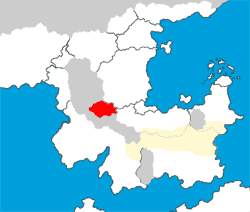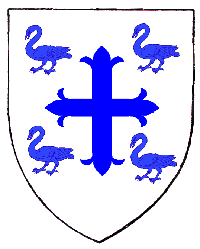Country Info: Valenne
 
|
| Terminology: | Valennian (vah-LENN-ee-an) people, one Valennian, many Valennians |
| Capital: | Flerbourg (FLARE-burg) |
| Monarch: | Duke Lawrence (the Grey), born 946. (Laurentius Dux Valenniae) |
| Coat of Arms: | Argent, a cross flory between four swans azure. |
An independent duchy culturally similar to its neighbors Allondell and Chardreau, Valenne is distinguished by its treatment of magic. After mages led a coup attempt against the Duke in 972, magery was outlawed to all except for ducally-approved mages. A second coup attempt followed in 997; this time, the Duke used ancient artifacts to render magery useless in his land, a condition that remains to this day.
History
The 972 Rebellion
In 972, the Duke Richard of Valenne died. As he was childless, his heir had originally been his nephew Gregory. However, Gregory himself had died earlier that year in a "hunting accident"; many believed he was actually murdered by his younger brother Lawrence. With Richard now dead, Lawrence become the new Duke. A cabal of mages and Elunians, sensing opportunity, attempted to topple Lawrence by supporting his cousin Bertrande de Pelatte's claim to the throne. Her claim was weaker than Lawrence's, but the mages believed that the Valennians would sour at the thought of having a murderer for a liege. Moreover, with their magical powers, the mages could make Bertrande victorious. When the Tamplonian church of Elune sent two "Turning Stones", magic artifacts that could amplify magical power, the mages were all the more certain.
They were wrong. The stones were lost in transit, and never arrived. Lady Bertrande had a sizeable rebel army and powerful mages, but the Duke still had greater numbers. Some Valennians might have believed the rumors about fratricide, but many others didn't buy it, or at least didn't buy it enough to take up arms against their liege lord. The Duke won the war at the battle of Carcassonne, the rebels defeated. Bertrande and her cadre went into hiding. Unbeknownst to nearly everyone, Bertrande secretly died of her war wounds; one of her followers (see below) assumed her identity to keep the spirit of the rebellion alive.
Duke Lawrence angrily banished most of the country's stronger mages, and toppled the Elunian temples, banning Elune's church from his realm. Now alarmed about the influence of mages, he stoked the fires of fear, playing upon popular superstitions and the peasants' fear of mages, and demanded that mages be licensed -- for a fee. The profits from these licenses went to fund a new group, the Seekers, who would seek out illegal use of magery. Licensed mages also had to take a loyalty oath and wear a blue headband. (Lawrence himself did not really fear magery, even secretly knowing a little himself, but wanted to control the power of his country's mages.)
Feeling alienated from her husband (be it the war, the magery policy, or the rumored fratricide), the Duke's wife, Lisette, vanished one night, along with the couple's eldest son, Gerard. The Duke's constables attempted to track her down, only to learn that she had taken refuge in a barn which tragically had burned down; perhaps the noblewoman did not know how to safely start a fire or light a lantern by herself. The Duke's men found only scraps and remnants of Lisette and Gerard's effects.
For the next few decades, the rebels remained in hiding, to periodically resurface and harass or attack the Duke's forces. Tamplonian aid kept them alive. The rebel raids would often be led by a young man known as "the White Talon".
The 997 Rebellion
In 997, the Duke decided to celebrate the 25th anniversary of his victory over the rebellion. The rebels decided to use this opportunity to rise anew, especially since they had recently learned information that might lead them to the long-lost Turning Stones. A second rebellion began at what is now called the Second Battle of Carcassonne.
In the course of the new rebellion, as "Bertrande" resurfaced to lead the rebels, it came to light that the original Bertrande was long since dead, her identity assumed by none other than Duchess Lisette, who wanted to see her husband deposed. Indeed, the "White Talon" was the Duke's eldest son, Gerard, and a legitimate heir to the throne. Lisette also claimed that her younger son, Gerome, was actually the product of an affair and not the Duke's son at all.
However, the Duke's forces were again victorious. Loyalist forces captured the Turning Stones and turned them over to the Duke, who used them not to amplify but to mute magery within the Duke's realm. With the rebels' mages now powerless, the Duke's forces vanquished the rebellion once more. Gerard was killed in the battle, removing any chance that a rebel might make a valid claim on the ducal throne. Lisette and the remnants of her forces fled and went into hiding, although after seeing her long-held dream of victory in tatters, she was now a broken woman with no passion for a third rebellion.
The Aftermath
With magery no longer an issue in Valenne, the Duke disbanded the Seekers and other mage-hunters, and dismissed many of his anti-mage courtiers, whose influence he disliked. In private he would even admit that removing himself from the influence of these courtiers, and not a fear of mages, was his primary motive for using the Stones. The Church of Elune, however, remains outlawed.
Though some now questioned whether Gerome was of his blood, Duke Lawrence confirmed Gerome as his son and heir. Increasingly weary of politics, and now feeling comfortable that the magery issue had been settled, Duke Lawrence began to turn over many state duties to the young man.
Over the next few years, many of the duchy's mages would understandably emigrate. (The Duke's own mage corps became a mercenary company, the Dierremont Irregulars.)
The magery-free zone that covered the country came to be called "the Null". It suppresses the ability of mages to tap into mana; magical items powered by magery are similarly affected. Mages report an uncomfortable, itchy sensation when within the Null's borders. (Divine magic is unaffected by the Null and works normally.)
The edges of the Null are sometimes faintly visible, leaving a faint blue shimmer where the Null begins. Where the boundaries of the Duke's realm are certain (e.g. the borders with Allondell or Chardreau), the delineation is precise, with magery clearly working on one side and not on the other. Where the Duke's borders are less clear (e.g. the Grendarr Mountains), the Null's effects slowly weaken as one passes out of Valenne.
Valennians and Mages
Duke Lawrence took common fear and superstition and played upon it. What might have once been the beliefs of the rural, illiterate peasants (who have little, if any, contact with the scholarly students of magic, the urban guilds, or the mage-knights) has now become widespread sentiment.
Valennians do not so much fear magery as they do mages. Valennians are just as able as anyone else to recognize that magery is a craft that can be used to good ends or bad ones. However, magery is a power, and power corrupts. For every tale of magery used to good ends, there’s the mage who craves power and summons beasts or raises the dead. Mages are strange and secretive, their lodges and covenants and guilds teaching arcane crafts that others cannot understand. Mages are too often focused on an intellectual goal (a new spell, an alchemical mixture, a lost relic) and ignore the impact such a goal will have on actual people: monsters summoned, foul substances poisoning the water and the crops, ancient evils best left buried terrorizing the countryside once again. Magery itself is just a tool, but it's the mages – the people – who misuse it.
The clergy use magic, too, but the churches keep their number in check by holding them to a set of principles. Sure, those principles aren't always ideal, like belligerent Rannashites or the creepy Traladosians, but at least they teach the clergy about right and wrong, and discipline those who stray. The priests use magic, but they use it for a noble purpose: to serve the gods. Mages have no such boundaries and no such goals. They do what they want, when they want. So before the Null, most Valennians approved of the Duke's requirements that mages be licensed and loyal; it provided a way to keep them in line. And since the Null, most Valennians are happy to be safe and secure from the dangers that mages create.
The Null
The rules mechanics on the Null are:- The Null blocks access to mana unless your powers are gods-granted; therefore all forms of Magic do not function except for Cleric Magic.
- Magic items (including potions) do not function unless they are divine in nature. (For instance, a permanently blessed weapon or a saint's bone would qualify. A magic item owned by a church or a magic item used by a saint would not; those are just magic items that happened to be used by a holy person.) An item is not "divine in nature" unless specifically stated. (If you already owned an item as of the date this proposal passed and believe it should be considered divine in nature, please make a proposal as such to the CG GWC.)
- Innate Powers do not function unless they represent a "natural ability" instead of a spell, e.g. using IP Blink to represent the ability to run fast. This "natural ability" must be stated in your IP proposal. (If you already have IP and believe it represents a natural ability, please make a proposal as such to the CG GWC.)
- Any spell (including potion effects) active on a person when they enter the Null is dispelled.
- Once taken back out of the Null, magic items (including potions) regain their powers.
- Spells cast into the Null fizzle on contact with it.
- When in the Null, anyone whose Magic is blocked by the Null (e.g. Mages, Mystics) feels a slight "pins and needles" tingling sensation that doesn't fade.
Monarch
Duke Lawrence (the Grey), born 946. Since the civil war of 997, Lawrence has passed many state functions onto his heir, Lord Gerome.
Nobles
Ruled by a Duke. Standard noble is the Baron. There are no Counts.
Major Cities
Flerbourg dominates the country.
